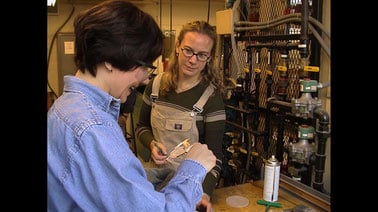Principles of Manufacturing
What you will learn
- A new perspective for design and operational decision making at all levels of manufacturing, in the context of volume manufacturing, where rate, quality, cost and flexibility are the key metrics
- How to operate and control unit processes to ensure maximum quality using basic and advanced statistical and feedback control methods
- How to design and operate systems of processes with optimal capacity, resilience and inventory
- How to design and operate optimal supply chain systems
- The financial underpinnings of a manufacturing enterprise, including new ventures
- Unit Process Variation and Control: Modeling and controlling temporal and spatial variation in unit processes
- Factory Level System Variation and Control: Modeling and controlling flows in manufacturing systems with stochastic elements and inputs.
- Supply Chain – System Variation and Control: How to operate and design optimal manufacturing-centered supply chains.
- Business Flows: Understanding the uses and flow of business information to start up, scale up and operate a manufacturing facility.
- Masters in Business Management
- Master in Technology in Computer science
- Masters in Technology in Mechanical Engineering
- Masters in Technology in Artificial Intelligence and Data Science
- Exciting career opportunities in positions such as Manufacturing Engineer, Supply Chain Engineer, Design Engineer, Product Engineering, Product Development Engineer (Source: MIT Mechanical Engineering department)
- Mean salary ranges of $70,000-95,000 (U.S. only; source: Indeed.com)
- The U.S. Bureau of Labor Statistics projects employment of industrial engineers to grow 10% from 2016 to 2026, faster than the average for all occupations. (all occupations = 7%).
- The growth rate of new manufacturing firms is at its fastest pace since 1993. (source: U.S. Census, Business Dynamics Statistics)
- 100% of graduates from MIT’s Masters of Engineering in Advanced Manufacturing & Design program are successfully employed within 6 months of completion
Program Overview
Develop the fundamental skills needed for global excellence in manufacturing and competitiveness with the Principles of Manufacturing MicroMasters Credential, designed and delivered by MIT’s #1-world ranked Mechanical Engineering department. Build your career with the credential or use it as credits towards a Master’s Degree by applying to MIT’s world-renowned Master of Engineering in Advanced Manufacturing and Design Blended Program.
This program provides students with a fundamental basis for understanding and controlling rate, quality and cost in a manufacturing enterprise.
The Principles of Manufacturing are a set of elements common to all manufacturing industries that revolve around the concepts of flow and variations. These principles have emerged from working closely with manufacturing industries at both the research and operational levels.
Targeted towards graduate-level engineers, product designers, and technology developers with an interest in a career in advanced manufacturing, the program will help learners understand and apply these principles to product and process design, factory and supply chain design, and factory operations.
This curriculum focusses on the analysis, characterization and control of flow and variation at different levels of the enterprise through the following subject areas:
- Unit Process Variation and Control: Modeling and controlling temporal and spatial variation in unit processes
- Factory Level System Variation and Control: Modeling and controlling flows in manufacturing systems with stochastic elements and inputs.
- Supply Chain – System Variation and Control: How to operate and design optimal manufacturing-centered supply chains.
- Business Flows: Understanding the uses and flow of business information to start up, scale up and operate a manufacturing facility.
User Reviews
Be the first to review “Principles of Manufacturing”
You must be logged in to post a review.







There are no reviews yet.